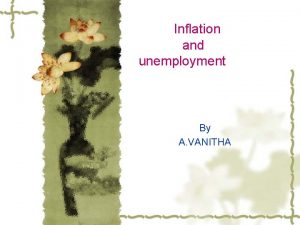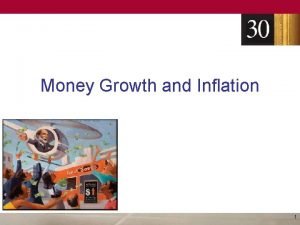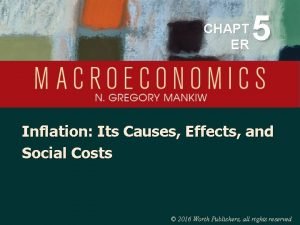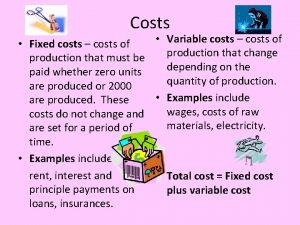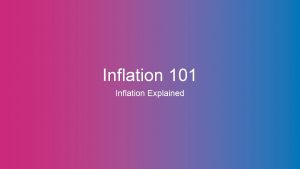Inflation Chapter 8 The Costs of Inflation Costs



- Slides: 3

Inflation Chapter #8

The Costs of Inflation • • • Costs of extremely high inflation obvious ($ no longer medium of exchange) Costs of E(inflation) not obvious but public’s distaste makes it policy issue Perfectly anticipated inflation: If economy is experiencing 5% inflation & anticipated inflation is also 5%, all contracts will build in expected 5% inflation – Nominal interest rates account for the inflation – Long term labor contracts account for the inflation – Tax brackets are typically adjusted to account for the inflation Inflation has no real costs, except for two qualifications: – Costs of holding currency ↑ with inflation & demand for currency decreases – Menu costs of inflation • • • Imperfectly anticipated inflation: better description of real world economies Most contracts in nominal terms. W/ unexpectedly ↑/↓ inflation debtors repay loans in cheaper/more expensive $. Some market exchanges skipped for inflation risk. Distributional cost of unexpected inflation (debtors vs. creditors) for all fixed assets – Money, bonds, savings accounts, insurance contracts, some pensions – Realized real interest rates are lower than nominal interest rates if inflation ↑

Inflation and Indexation • W/ high & uncertain inflation, long-term nominal borrowing is impossible: lenders too uncertain about real value of repayments they will receive – Solution is indexed debt: either interest or principle or both adjust for inflation • Interest typically equals stated real rate plus actual inflation risk reducing • Some labor contracts include cost of living adjustment (COLA) • Suppose real prices of material ↑ & firms pass cost ↑ on as ↑ output prices – W/ COLA wages also ↑, leading to further CGS, price & wage ↑ Indexation feeds an inflation spiral • Differentiate supply & demand shocks to understand COLA consequences – W/ demand shock there is “pure” inflation disturbance & firms can pay the same real wages w/o being affected by indexation – W/ supply shock real wages ↓ & full indexation prevents this from happening Wage indexation complicates econ adjustment to supply shocks • Many call for broad scale indexation (including bonds & taxes) because: ─ Inflation would be easier to live with ─ Costs of unanticipated inflation would disappear • Governments reluctant to index for three reasons: – Indexing impedes adjust to shocks when changes in relative prices are needed – Indexing adds another layer of calculation to most contracts – Indexation weakens political will to fight inflation make the economy worse off
